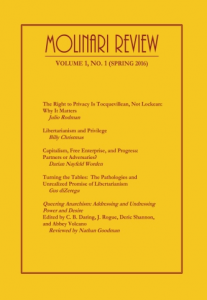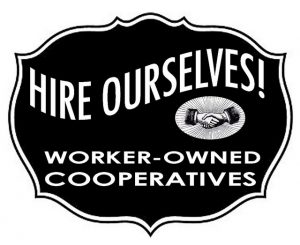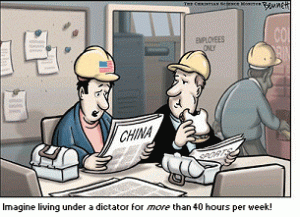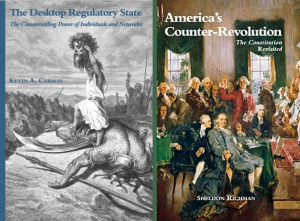[cross-posted at BHL]
I see that a video has recently been posted on YouTube of me, Jacob Levy, David Bernstein, and Richard Geddes on a panel on race, class, and gender at an IHS conference at Dulles Airport in 1997. Buncha young punks.
[cross-posted at BHL]
I see that a video has recently been posted on YouTube of me, Jacob Levy, David Bernstein, and Richard Geddes on a panel on race, class, and gender at an IHS conference at Dulles Airport in 1997. Buncha young punks.
[cross-posted at BHL]
I’m pleased to announce (belatedly) a new anthology from the Center for a Stateless Society (C4SS): Free Markets & Capitalism?: Do Free Markets Always Produce a Corporate Economy?, edited by Cory Massimino and James Tuttle.
One third of Free Markets & Capitalism? (not to be confused with C4SS’s earlier anthology Markets Not Capitalism) reproduces an online exchange from last year among Kevin Carson, Derek Wall, and Steve Horwitz on the question of whether corporate capitalism would indeed wither away in a genuinely freed market, as left-libertarians contend, or whether instead, as both capitalist and socialist critics of left-libertarianism maintain (whether cheerfully or gloomily), market incentives would tend to reproduce much of the structure of corporate capitalism even without state intervention to support the process.
The other two-thirds of the book are devoted to background readings (most by Kevin Carson – including his classic, The Iron Fist Behind the Invisible Hand – but also a couple by me, and one by the late Roy Childs) expounding the left-libertarian position on the issue.
Buy a copy today! Buy two copies tomorrow! Buy four copies the next day, and eight the day after that, and so on ….
[cross-posted at C4SS and BHL]
The Molinari Institute (the parent organization of the Center for a Stateless Society) is proud to announce the publication of the first issue of our new interdisciplinary, open-access, libertarian academic journal, the Molinari Review, edited by yours truly, and dedicated to publishing scholarship, sympathetic or critical, in and on the libertarian tradition, very broadly understood. (See our original call for papers.)
| Kindle | |
|---|---|
| Amazon US | Amazon US |
| Amazon UK | Amazon UK |
| CreateSpace Store |
It should also be available, now or shortly, on other regional versions of Amazon. And later on it’ll be available from our website as a free PDF download (because copyright restrictions are evil).

So what’s in it?
In “The Right to Privacy Is Tocquevillean, Not Lockean: Why It Matters” Julio Rodman argues that traditional libertarian concerns with non-aggression, property rights, and negative liberty fail to capture the nature of our concern with privacy. Drawing on insights from Tocqueville and Foucault, Rodman suggests that privacy is primarily a matter, not of freedom from interference, but of freedom from observation, particularly accusatory observation.
In “Libertarianism and Privilege,” Billy Christmas charges that right-wing libertarians underestimate the extent and significance of harmful relations of privilege in society (including, but not limited to, class and gender privilege) because they misapply their own principles in focusing on proximate coercion to the exclusion of more indirect forms of coercion; but, he argues, broadening the lens of libertarian inquiry reveals that libertarian principles are more powerful tools for the analysis of privilege than privilege theorists generally suppose.
In “Capitalism, Free Enterprise, and Progress: Partners or Adversaries?,” Darian Nayfeld Worden interrogates traditional narratives of the Industrial Revolution. Distinguishing between capitalism (understood as a separation between labour and ownership/management) and free enterprise, Nayfeld Worden maintains that the rise of capitalism historically was in large part the result of a suppression of free enterprise, and that thanks to state intervention, the working-class benefited far less from industrialisation and technological innovation than they might otherwise have done.
In “Turning the Tables: The Pathologies and Unrealized Promise of Libertarianism,” Gus diZerega contends that libertarians misunderstand and misapply their own key concepts, leading them to embrace an atomistic vision of society, and to overvalue the market while undervaluing empathy and democracy. (Look for a reply or two in our next issue.)
Finally, Nathan Goodman reviews Queering Anarchism: Addressing and Undressing Power and Desire, an anthology edited by C. B. Daring, J. Rogue, Deric Shannon, and Abbey Volcano. Goodman praises the book for its illumination of many aspects of the intersection between anarchist tradition and the LGBTQ community, with particular emphasis on the tension between LGBTQ activists who seek to dismantle oppressive institutions and those who merely seek inclusion within them; but in the area of economics, he finds its authors to be too quick to dismiss the free market or to equate it with the prevailing regime of corporatist privilege.
Want to order a copy? See the ordering information above.
Want to contribute an article to an upcoming issue? Head to the journal’s webpage.
Want to support this project financially? Make a donation to the Molinari Institute General Fund.
[cross-posted at C4SS and BHL]
My BHL colleague Chris Freiman has three questions for left-libertarians concerning how we reconcile our “commitment to workplace democracy” with the “other commitments that libertarians are inclined to have.” Here I suggest some answers.
Does workplace democracy really eliminate bosses?
Most libertarians, Chris notes, “would deny that granting all citizens a vote in a political democracy means that you are your own boss in a meaningful sense.” So in a workplace democracy, just as in a political democracy, isn’t it likewise true that “your single vote is unlikely to be decisive, meaning that you are exercising little to no real control,” and instead have simply “traded one boss for a thousand bosses”?

First: left-libertarians think that economic freedom will result in a much more competitive labour market. One dimension of this will be greater competition among different workplace structures, so that traditional hierarchical wage-labour employers will face more competition from workers’ co-ops on the one hand and individual proprietorships on the other. But another dimension will be greater competition among workplace structures of the same type; thus workers’ co-ops, for example, will face competition from many other workers’ co-ops. Just as traditional employers have to treat workers better when there are many other traditional employers competing for those workers, so co-ops have to do likewise when they face heavy competition from other co-ops. Thus in the kind of competitive market that we’d expect to result from the abolition of the current system of state privilege, it will be very hard for co-ops to maintain the kind of micromanaging, chickenshit control over their members that Chris is worried about.
Indeed, the ideal for many left-libertarians is for the situation of workers to become more similar to that of independent contractors. As agorist pioneer Samuel E. Konkin III noted, “independent contracting lowers transactions costs … relative to boss/worker relationships running the gamut from casual labor with annoying paperwork and records to full-scale Krupp worker welfarism.” And the transformation of wage labour into something approaching independent contractor status naturally results from a more competitive labour market, as the availability of other employment opportunities raises the cost of micromanagement, for co-ops and traditional employers alike.
Second: the reference to “a thousand bosses” suggests that Chris is envisioning workplace democracy as applying typically to vast firms with thousands of workers. I agree that in such large firms, the influence of any individual’s vote is likely to be negligible; but that is precisely why those who want more control over their day-to-day work situation will tend to prefer working for smaller co-ops rather than larger ones.
Chris anticipates this answer, and replies that workers’ co-ops “can’t get too small if they want to take advantage of economies of scale.”
Now I have to say, asking a left-libertarian “what about economies of scale?” is a bit like asking Cato the Elder “how come you never say what should be done about Carthage?” After all, one of the positions for which left-libertarians are best known is our claim that in a freed market, economies of scale would tend to be overtaken by diseconomies of scale at a fairly low point, and that the enormous firms that prosper in our present economy are made possible, for the most part, only by systematic state intervention that props them up by socialising the costs generated by diseconomies of scale while allowing the firms to pocket the benefits generated by economies of scale. (For details, see Kevin Carson’s book Organization Theory: A Libertarian Perspective, available either in print or as a free download.)
Third: one of the most frustrating things about ordinary wage labor is the extent to which the commands of bosses are out of touch with the reality of what is actually happening on the shop floor; this is a Hayekian knowledge problem that predictably besets large, bureaucratic organisations. (Again, see Kevin Carson’s book on this point.) Consequently, often the only thing keeping a firm profitable is the fact that workers quietly disregard their bosses’ instructions.
I once taught at a university (I won’t say which; I’ve taught at five) where the administration, having read somewhere that no one can remember more than three points from a lecture, demanded that in future no lecture should contain more than three points. Following this rule would of course have made it impossible for the faculty to do their jobs, i.e., to cover in a semester the material their courses are supposed to cover. I suspect this requirement was also in conflict with contractually-mandated academic freedom, but in any case the problem was solved by the fact that most professors simply ignored it. (The rule was essentially unenforceable anyway, because who decides what counts as one “point”?)
In the words of an old anarcho-syndicalist pamphlet:
Every industry is covered by a mass of rules, regulations and agreed working practices, many of them archaic. If applied strictly they would make production difficult if not impossible. … If managers’ orders were completely obeyed, confusion would result and production and morale would be lowered. In order to achieve the goals of the organisation workers must often violate orders, resort to their own techniques of doing things, and disregard lines of authority. Without this kind of systematic sabotage much work could not be done.
Indeed, that is why actually following all the rules and instructions is considered a form of worker resistance – a “rule-book slowdown”!
One of the great advantages of workplace democracy is that workers actually know what workers do all day, thus greatly alleviating the familiar problems of information flow in hierarchies. And of course a rule that has to be followed by the people making it, as in a workers’ co-op, is likely to be less obnoxious, for both informational and incentival reasons, than a rule made by one group for another group, as in traditional firms.
Let me give a concrete example of these various points. Like most of my BHL colleagues, I myself work in an industry (university academia) that combines bosses (the administration) with some aspects of worker control (the faculty). Both groups regularly generate edicts that are completely insane, but in interestingly different ways. The insanity of administrative demands tends to reflect the extent to which administrators are completely out of touch with, and not especially interested in, what our work as faculty actually involves. (Hence the aforementioned three-points-per-lecture rule.) The insanity of demands from fellow faculty rarely takes that form, but is instead mostly ideologically driven. Which one is worse depends on the issue. I can certainly understand an academic worrying that workplace democracy would, in this case, involve faculty governance being extended to all the issues that administrative governance now covers; whether this would be better or worse than the status quo, it surely wouldn’t be much better. But under a freed market, what we should expect universities to look like is not very much like “just what they are now, only with more faculty governance.”
Thanks to government regulations, higher education is one of the most highly cartelised industries in existence. Accreditation laws make it extraordinarily difficult to start a university, or to run one in nonstandard ways; and this artificial shortage, together with the perverse incentives of government funding, boosts tuition prices ever higher (a situation from which administrators disproportionately benefit, at the expense of faculty and students; see here and here). In a freed market, higher education jobs (whether in a traditional university structure or something else) would be so much more plentiful as to constitute a salutary check on the irrationality of faculty governance.
What about rational ignorance?
Chris likewise wonders why libertarian critiques of political democracy that appeal to rational ignorance don’t cut against workplace democracy too. (Chris calls workplace democracy “economic democracy,” but that phrase seems to have a rather different meaning.) “If the vote I cast,” Chris notes, “is probably going to be inconsequential, then I have little incentive to make it a good one.” Given that rational ignorance on the part of voters is “a standard explanation for the poor quality of political governance,” why won’t workplace democracy face the same problem?
Well, there are several important differences between workplace democracy and political democracy. One is that, given left-libertarian predictions about average firm size in a freed market, the number of voters per firm will tend to be small, meaning that each individual vote counts more. In addition, in a small firm, workers can influence the final outcome not only through voting but also through trying to persuade fellow voters via argument.
Not only is the power of voice typically stronger in workplace democracy than in political democracy, but so is the power of exit. The only way one can exit a political democracy, ordinarily, is by moving to a different geographical region (and if your political democracy is the U.S., even that won’t do it). If moving to Denmark would be prohibitively costly to me (whether financially or otherwise), I don’t have much incentive to research the differences between Danish and American laws. But a workplace democracy can be exited just by switching jobs; given the lower cost, I have more incentive to become well-informed about the pros and cons of different firms’ policies.
Moreover, much of the information that participants in workplace democracy need is information they already have by virtue of working there, so the question of how much incentive they have to acquire the info is moot. I’m talking about, for example, Hayekian local knowledge about the production process – knowledge that often travels poorly up chains of command.
Are capitalist acts between consenting adults permitted?
By “capitalist acts,” Chris, following the Nozick quote, presumably means acts of market exchange. (Of course this is not what left-libertarians mean by “capitalist acts.”) Thus he asks: “Suppose a risk-averse worker wants to sell her shares to a second worker in exchange for a steady income. Is this transaction permitted?”
Permitted by whom? If the members of a workers’ co-op want to arrange things so that shares in the co-op are transferable, or if they want to arrange things so that shares in it are not transferable, those are both permissible private contracts – as is a traditional employment-for-hire contract, at least when it takes place against a background without state privilege. Left-libertarians are not interested in interfering in the details of private contracts (though many of us would insist that enforcement of service contracts be by damages rather than specific enforcement, for familiar libertarian reasons). We may regard some workplace structures as morally preferable to others, but we regard a peaceful combination of a) moral suasion, and b) letting economic incentives work, as the best strategy for implementing this preference.

What left-libertarians oppose is not wage labour per se, but the wage system – a system in which, thanks to the state-enabled monopolisation of the means of production (as well as the use of those means) in the hands of the ruling class, the working class has no choice but to perform wage labour for others. In a freed market, no doubt many workers would still choose wage labour – but they would not be forced to do so, given that rival options like workers’ co-ops and self-employment would no longer be kept artificially scarce (and the plentifulness of such rival options would also render such wage labour as existed much less unpleasant).
Ah, but if we allow workers to opt out of workplace democracy in the way described, Chris replies, then “we have reason to think that hierarchies will arise spontaneously from an initial condition of worker equality.” (This is what Marxists seem to think too.)
Okay, I’ll bite: what reason is that? Chris says there is one, but he doesn’t say what it is – unless it’s just the “risk-aversion” he mentioned earlier. But there are other methods of reducing risks besides wage labour – mutual-aid insurance, for example, which flourished until the state shut it down. Plus, in a more prosperous economy there would be less need for risk-aversion.
Left-libertarians argue that hierarchical workplaces are both unpleasant and inefficient; hence, while some may exist in a freed market, they are unlikely to predominate. The fact that workers will be free to work in hierarchical workplaces if they so choose is no reason to think that most of them will do so.
Here’s an early (pre-Spencer) statement of the law of equal freedom and/or non-aggression principle:
[N]o movement can be permanently successful among progressive minds which stops short of a full and complete recognition of the entire liberty of the individual, so long as the action coming from such liberty trespasses upon neither the person or [sic] property of another.
Particularly interesting is its source: an 1837 publication of the First International; see details here. (The article is about Josiah Warren, but the quotation is not from Warren; in fact Warren wanted to make it less libertarian by including a right to one’s “reputation,” i.e., to the contents of other people’s minds.)
I am an idiot. Of course the First International didn’t exist in 1837. And so of course this quotation is from 1873, and so of course it’s not pre-Spencer.
[cross-posted at BHL]
Two of my Molinari/C4SS comrades have new books out.

One is Kevin Carson’s The Desktop Regulatory State: The Countervailing Power of Individuals and Networks. The blurb says:
Defenders of the modern state often claim that it’s needed to protect us – from terrorists, invaders, bullies, and rapacious corporations. Economist John Kenneth Galbraith, for instance, famously argued that the state was a source of “countervailing power” that kept other social institutions in check. But what if those “countervailing” institution – corporations, government agencies and domesticated labor unions – in practice collude more than they “countervail” each other? And what if network communications technology and digital platforms now enable us to take on all those dinosaur hierarchies as equals – and more than equals? In The Desktop Regulatory State, Kevin Carson shows how the power of self-regulation, which people engaged in social cooperation have always possessed, has been amplified and intensified by changes in consciousness – as people have become aware of their own power and of their ability to care for themselves without the state – and in technology – especially information technology. Drawing as usual on a wide array of insights from diverse disciplines, Carson paints an inspiring, challenging, and optimistic portrait of a humane future without the state, and points provocatively toward the steps we need to take in order to achieve it.
The other is Sheldon Richman’s America’s Counter-Revolution: The Constitution Revisited. The blurb says:
This book challenges the assumption that the Constitution was a landmark in the struggle for liberty. Instead, Sheldon Richman argues, it was the product of a counter-revolution, a setback for the radicalism represented by America’s break with the British empire. Drawing on careful, credible historical scholarship and contemporary political analysis, Richman suggests that this counter-revolution was the work of conservatives who sought a nation of “power, consequence, and grandeur.” America’s Counter-Revolution makes a persuasive case that the Constitution was a victory not for liberty but for the agendas and interests of a militaristic, aristocratic, privilege-seeking ruling class.

Wisdom from the right-libertarian corgi
Another of my Molinari/C4SS comrades, Nick Ford, has a forthcoming anthology on anti-work anarchism, titled Instead of a Book, By a Man Too Lazy to Write One; check out the description.
| M | T | W | T | F | S | S |
|---|---|---|---|---|---|---|
| 1 | ||||||
| 2 | 3 | 4 | 5 | 6 | 7 | 8 |
| 9 | 10 | 11 | 12 | 13 | 14 | 15 |
| 16 | 17 | 18 | 19 | 20 | 21 | 22 |
| 23 | 24 | 25 | 26 | 27 | 28 | |